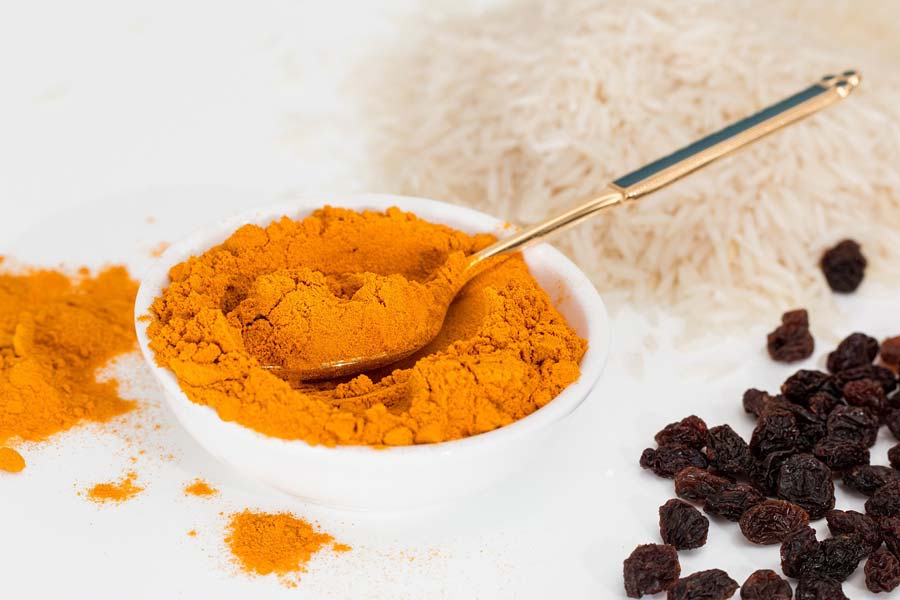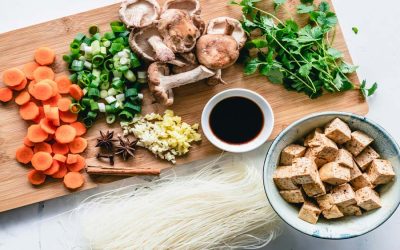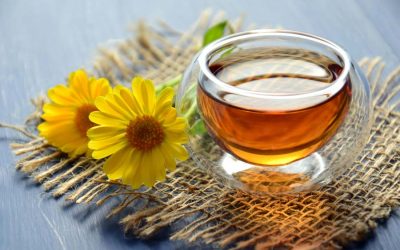This week is UK national curry week, so we’ve decided to join in with the celebrations and focus on the Indian spice turmeric.
Turmeric is the spice which gives curry its gloriously rich yellow colour. It’s been treasured in India for thousands of years, both as a spice and medicinal herb. More recently a growing pile of research papers are backing up what the Indians knew all along – it really does have healing properties. Scientists have identified a bioactive component called curcumin, which they believe is responsible for many of its health benefits. It is a polyphenol that has been demonstrated to have powerful antioxidant and anti-inflammatory activity. Studies show the health benefits of curcumin can help with many conditions, including metabolic syndrome, arthritis, asthma, anxiety and even cognitive decline.
Tackling Inflammation
It is now accepted long-term low-level inflammation plays a major role in almost every chronic Western condition, so finding ways to tackle it has become a significant health priority. Studies show curcumin can help dampen inflammation by inhibiting the activity of various enzymes and signalling molecules which play a role in inflammation. In particular, it acts as a COX-2 inhibitor, helping reduce inflammation and pain. It’s been demonstrated curcumin can match the effectiveness of some powerful anti-inflammatory drugs, and the great news is there are no side effects.
Protects Against Free Radicals
Another major contributor to chronic illness is free radicals or reactive oxygen species. They are produced in our bodies every minute of the day as by-products of metabolism or created during cellular responses to toxins, inflammatory cytokines and bacterial invasion. Antioxidants are needed to help neutralise and protect the body from them.
If levels of free radicals become elevated, it can cause ‘oxidative stress’, which may damage cellular biomolecules like proteins, lipids, and nucleic acids. Oxidative stress is believed to be one of the mechanisms behind ageing and many diseases. Curcumin is a potent antioxidant which can help neutralise these free radicals. Studies show it may also help reduce their production and increase the activity of antioxidant enzymes.
Brain Health
It is these antioxidant and anti-inflammatory actions which have made curcumin a good candidate for brain health. It has been used in various protocols for dementia and traumatic brain injury. Studies suggest it can help improve memory and cognitive function and potentially reduce the risk of neurodegenerative diseases like Alzheimer’s. Studies show it may help delay the degradation of neurons. Under certain circumstances, brain cells are capable of forming new connections and can also multiply and increase in number. One of the main drivers of this process is brain-derived neurotrophic factor, which is a type of growth hormone. It is theorised curcumin may help promote the production of this hormone. Low levels are linked to conditions like depression and Alzheimer’s disease.
Arthritic Help
Osteoarthritis was once considered a purely degenerative condition, but it is now recognised that it has inflammatory aspects, too. It has been connected with systemic inflammation. Several studies have shown curcumin can help reduce pain and improve joint function in people with both rheumatoid and osteoarthritis.
Liver Support
Oxidative stress is considered one of the major contributors to liver damage. Various things, including alcohol, drugs, viral infections, environmental pollutants and dietary toxins, can cause it. It can result in liver injury, non-alcoholic liver disease, liver fibrosis and cirrhosis.
Historically, curcumin has been used to support the liver. Studies show it exerts remarkable protective and therapeutic benefits against the effects of oxidative-associated liver diseases. It has been shown to reduce fat accumulation in the liver, improve the metabolism of lipids, and reduce inflammation. Additionally, research suggests it may protect against oxidative stress and help restore normal liver functioning.
Blood Sugar Balance
It’s been shown to help regulate blood sugar levels, making it a valuable supplement for people with diabetes or those at risk of developing the condition. It may also improve insulin sensitivity and reduce complications related to diabetes, such as diabetic neuropathy and retinopathy. Don’t forget its anti-inflammatory and antioxidant properties may help protect the pancreas and other organs affected by diabetes.
Heart Disease
Curcumin has been shown to have many cardiovascular benefits. These include its potential to help lower cholesterol, reduce the risk of blood clots and prevent plaque build-up in the arteries. Some studies have even found it can improve the function of the endothelium, the lining of blood vessels. It is well known endothelial dysfunction is a significant driver of heart disease and high blood pressure.
Curcumin and Cancer
Some studies have looked at its potential role in cancer prevention. Research suggests that it may help inhibit the growth of cancer cells and even induce apoptosis (cell death) in some cancerous cells. Its anti-inflammatory and antioxidant properties may also help reduce the risk of cancer development.
Harness the Healing Power
Curcumin really does seem to have healing properties. Supplementing with curcumin can be a great way to protect the body from inflammation and oxidative stress.
Product Recommendations
Brainpower™ is a potent combination of liposomal curcumin with resveratrol. Liposome technology encapsulates the ingredients in a tiny fat bubble, quickly delivering them where needed. Its antioxidant and anti-inflammatory properties are highly recommended for those seeking to support brain health naturally.
CurcuminX4000® Original capsules are formulated with high-quality Meriva® curcumin, which is supported by over 35 human trials. Meriva® uses curcumin phytosome technology to optimise bioabsorption.
References
https://www.ncbi.nlm.nih.gov/pmc/articles/PMC6073929/gov/pmc/articles/PMC5664031/
https://www.ncbi.nlm.nih.gov/pmc/articles/PMC6073929/
https://pubmed.ncbi.nlm.nih.gov/27124606/
https://www.ncbi.nlm.nih.gov/pmc/articles/PMC6163782/




